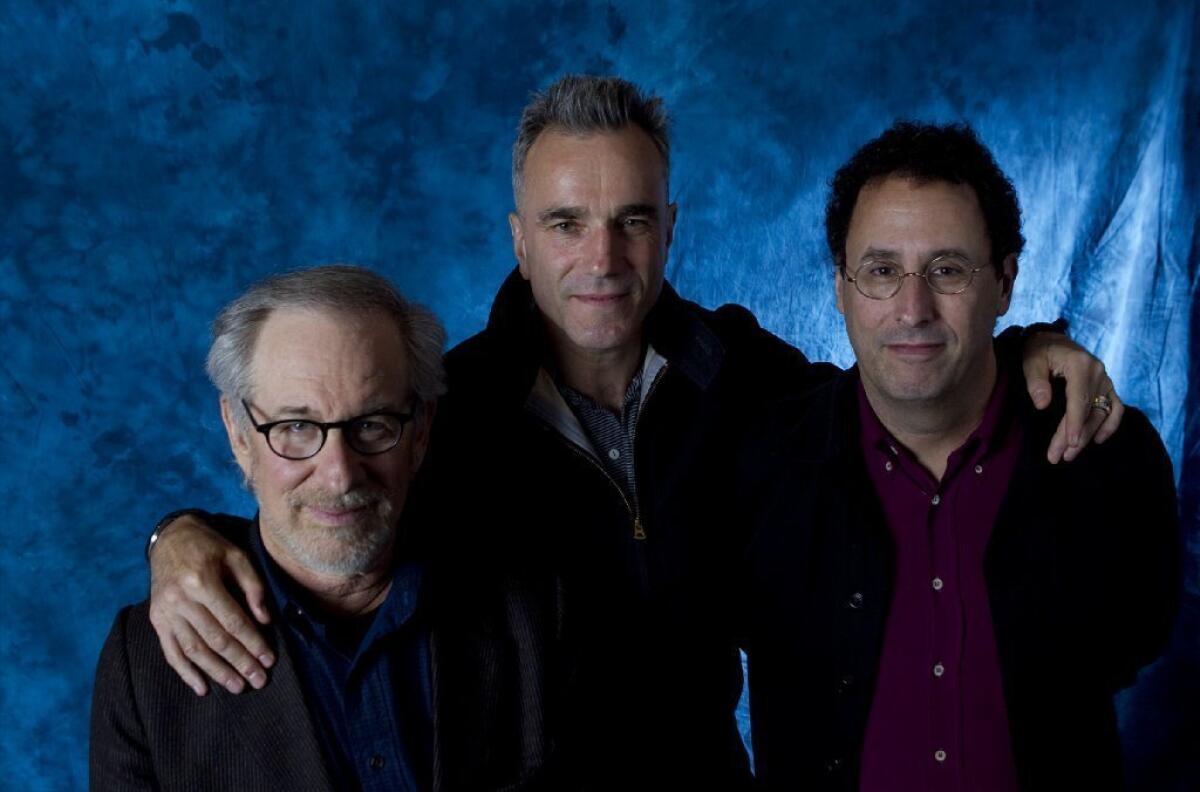Two new Tony Kushner books: ‘Lincoln’ script and revised ‘Angels’

“Lincoln” has been a big hit in movie theaters, and on Jan. 22 Tony Kushner’s screenplay for Steven Spielberg’s film will arrive in book form, to be followed in late February by another new Kushner book -- the revised script for “Angels in America,” the early 1990s stage drama that established him as a leading playwright.
Kushner’s longtime publisher, Theatre Communications Group, is issuing both volumes -- the film script about Abraham Lincoln’s struggle to push the constitutional amendment abolishing slavery through Congress during the waning days of the Civil War, and the epic, seven-hour play about gay men trying to cope with the AIDs crisis during the 1980s.
The new book version of “Angels in America” includes changes Kushner made for the play’s 2010 off-Broadway revival at New York’s Signature Theatre, and a new introduction by the playwright.
Dafina McMillan, a spokeswoman for TCG, which, in addition to publishing books and American Theatre magazine is the leading national service organization for nonprofit theaters, said publication of the revised “Angels in America” had been planned initially for January, but was pushed back to avoid a conflict with “Lincoln.”
Kushner was a literary manager for TCG in the late 1980s -- a day job he left so he could devote all his time to writing “Angels in America.” But his ex-employer continues to benefit from his talents: According to McMillan, the various book editions of “Angels” published since 1993 have sold more than 500,000 copies, making it by far TCG’s most popular title.
In a recent interview, James Houghton, artistic director of the Signature Theatre, said Kushner’s 2010 script included “subtle changes” in the play’s first part, “Millennium Approaches,” but “quite a few changes” in the second half, “Perestroika.”
Houghton thinks the most telling revisions bring more dimension to the character of Joe Pitt. The straight-arrow young Mormon lawyer from Salt Lake City idolizes Ronald Reagan and is being groomed as a potential star of conservative Republicanism. But he has more immediate issues as a gay man worn out by his long struggle to deny his sexual nature.
Now, Houghton said, “Joe’s more expressive, and that voice adds to the [character’s] complexity.”
Kushner polished “Millennium Approaches” for three years before the Mark Taper Forum in Los Angeles staged the first full production of the entire “Angels in America” in November 1992, but the play’s second half was more of a deadline job. Kushner struggled to perfect “Perestroika” before the Taper run, then kept wrestling with it for another year leading up to its opening on Broadway.
“My back went out and I gained 40 pounds,” while sweating over “Perestroika,” the playwright recalled recently. “It was incredibly hard, the hardest thing I’’ had to do before the screenplay to ‘Lincoln.’”
“I hope -- I feel now -- that I’m done with it,” Kushner added. “I may revisit it the next time there’s a [major] revival. Maybe I’m finished.”
Long before Spielberg used Kushner as a screenwriter (they first worked together on the 2005 film “Munich”), Kushner used Spielberg as comic relief.
In the climactic moment of “Millennium Approaches,” an angel bursts through the bedroom ceiling of the play’s hero, AIDS patient Prior Walter, to anoint him as a prophet. Terrified and astonished, Prior tries to pinch himself with a joke: “Very Steven Spielberg.”
ALSO:
Could “Angels in America” happen today?
“Lincoln” was a tall order for Spielberg, Day-Lewis
How “Angels in America” changed the national conversation
MORE
INTERACTIVE: Christopher Hawthorne’s On the Boulevards
TIMELINE: John Cage’s Los Angeles
PHOTOS: Arts and culture in pictures
More to Read
The biggest entertainment stories
Get our big stories about Hollywood, film, television, music, arts, culture and more right in your inbox as soon as they publish.
You may occasionally receive promotional content from the Los Angeles Times.











